This article is based on a poster originally authored by Christopher Becker, T. Ishigami, S. Adachi, S. Funayama, K. Kotagiri and N. Ichimura, which was presented at ELRIG Drug Discovery 2024 in affiliation with Aurora Microplates and Zeon Corporation.
This poster is being hosted on this website in its raw form, without modifications. It has not undergone peer review but has been reviewed to meet AZoNetwork's editorial quality standards. The information contained is for informational purposes only and should not be considered validated by independent peer assessment.

Overview
We have developed ready-to-use COP* microplates coated with Zeon's original coating materials for adherent cell culture and cell-based assays. Our plates are applicable to various types of cells, including cell lines, primary cells, and neural cells. Our plates feature good bottom flatness, low autofluorescence, and excellent storage stability at room temperature for 12 months.
* Cyclo Olefin Polymer (COP) is a thermoplastic resin developed by Zeon
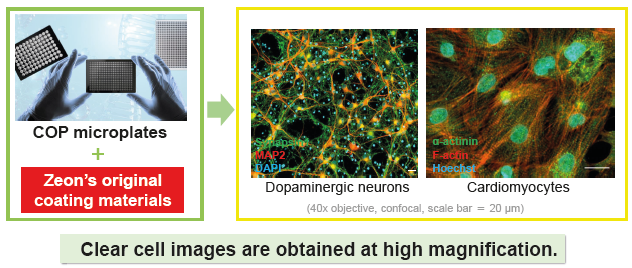
Image Credit: Image courtesy of Christopher Becker et al., in partnership with ELRIG (UK) Ltd.
Features
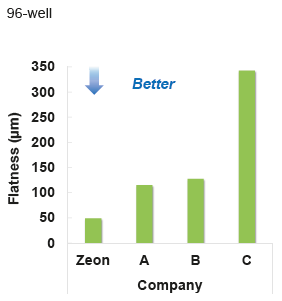
Bottom flatness. Image Credit: Image courtesy of Christopher Becker et al., in partnership with ELRIG (UK) Ltd.
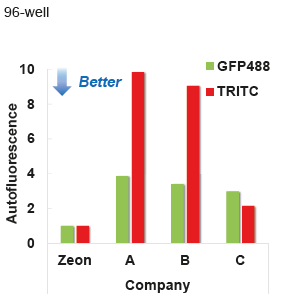
Autofluorescence. Image Credit: Image courtesy of Christopher Becker et al., in partnership with ELRIG (UK) Ltd.
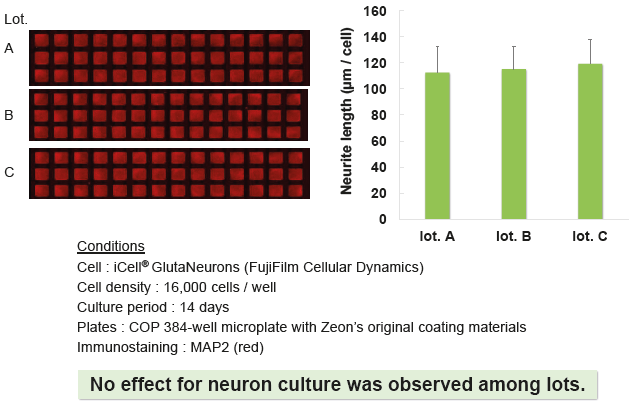
Lot-to-lot variation. Image Credit: Image courtesy of Christopher Becker et al., in partnership with ELRIG (UK) Ltd.
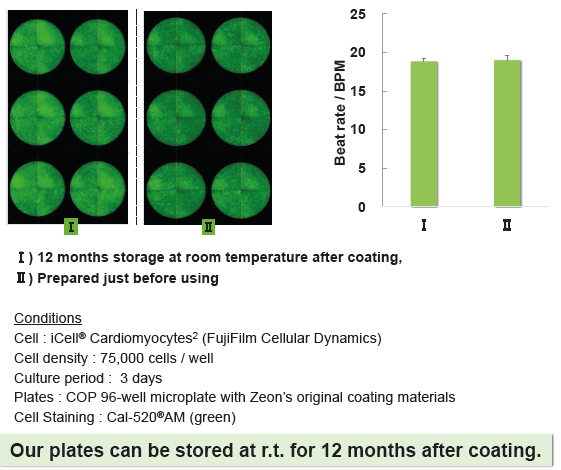
Storage performance. Image Credit: Image courtesy of Christopher Becker et al., in partnership with ELRIG (UK) Ltd.
Suitable applications
Source: ELRIG (UK) Ltd.
| Cell type |
Cells |
Application examples |
| Cell lines |
U2-OS, A549, MCF-7, HeLa, PANC-1, C2C12, HEK293, etc. |
Apoptosis, Autophagy, DNA damage, Lipid droplet size and number, Cell differentiation, etc. |
| Primary |
Mesenchymal stem cell |
Adipogenic differentiation
Osteogenic differentiation |
| Human iPSC-derived cells |
Neural cells (Dopa, Motor, GABA, Gluta)
|
Neurite outgrowth
|
| Cardiomyocytes |
Cardiotoxicity assessment |
Comparison with existing precoated microplates
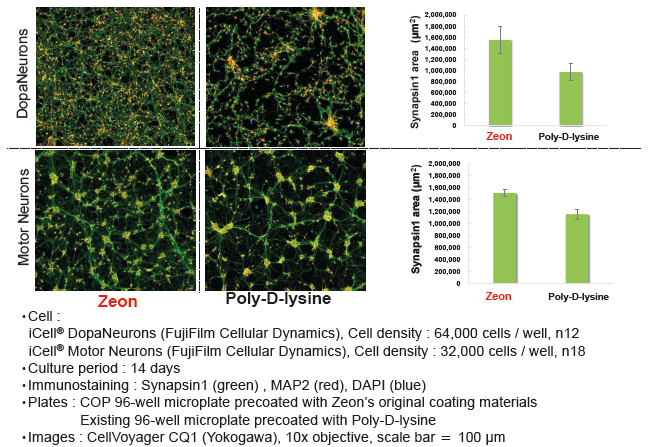
Neural cell attachment. Image Credit: Image courtesy of Christopher Becker et al., in partnership with CellVoyager CQ1 (Yokogawa)
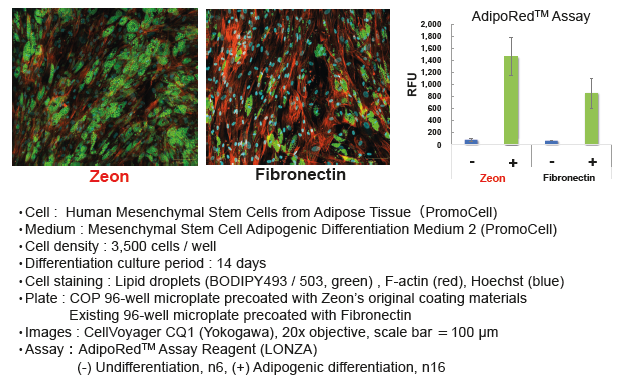
Adipogenic differentiation. Image Credit: Image courtesy of Christopher Becker et al., in partnership with CellVoyager CQ1 (Yokogawa)
Assay examples
Neurite outgrowth
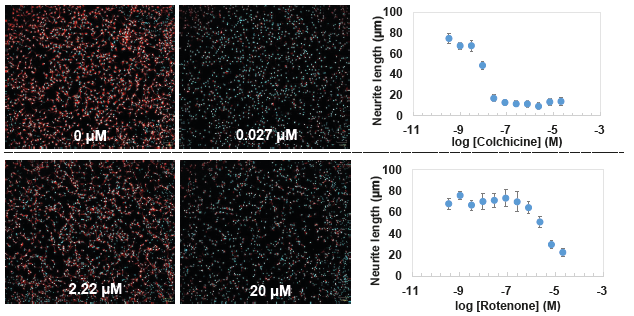
iCell® GABANeurons (FujiFilm Cellular Dynamics) were seeded into the COP 384-well precoated with Zeon's original coating materials at 10,000 cells/well. After 48 hours incubation, colchicine and rotenone were transferred for a concentration of 20 µM~0.34 nM, n7 in each well. Plates were then incubated at 37 °C and 5% C02 for 48 hours. Cells were then fixed, stained. The images of MAP2 (red), DAPI (blue) were acquired using Yokogawa CellVoyager CQ1 (10x objective, confocal, scale bar = 100 µm). Neurite length were quantified with MAP2 using image analysis software (CellPathfinder, YOKOGAWA). Image Credit: Image courtesy of Christopher Becker et al., in partnership with CellPathfinder, YOKOGAWA
Summary
- We have developed COP microplates coated with Zeon's original coating materials.
- Our plates have excellent bottom flatness and storage performance at room temperature.
- Cells cultured on our plates showed better performance compared to existing precoated microplates.
- Our plates are suitable for cell-based assays that use various cells.
About ZEON Europe GmbH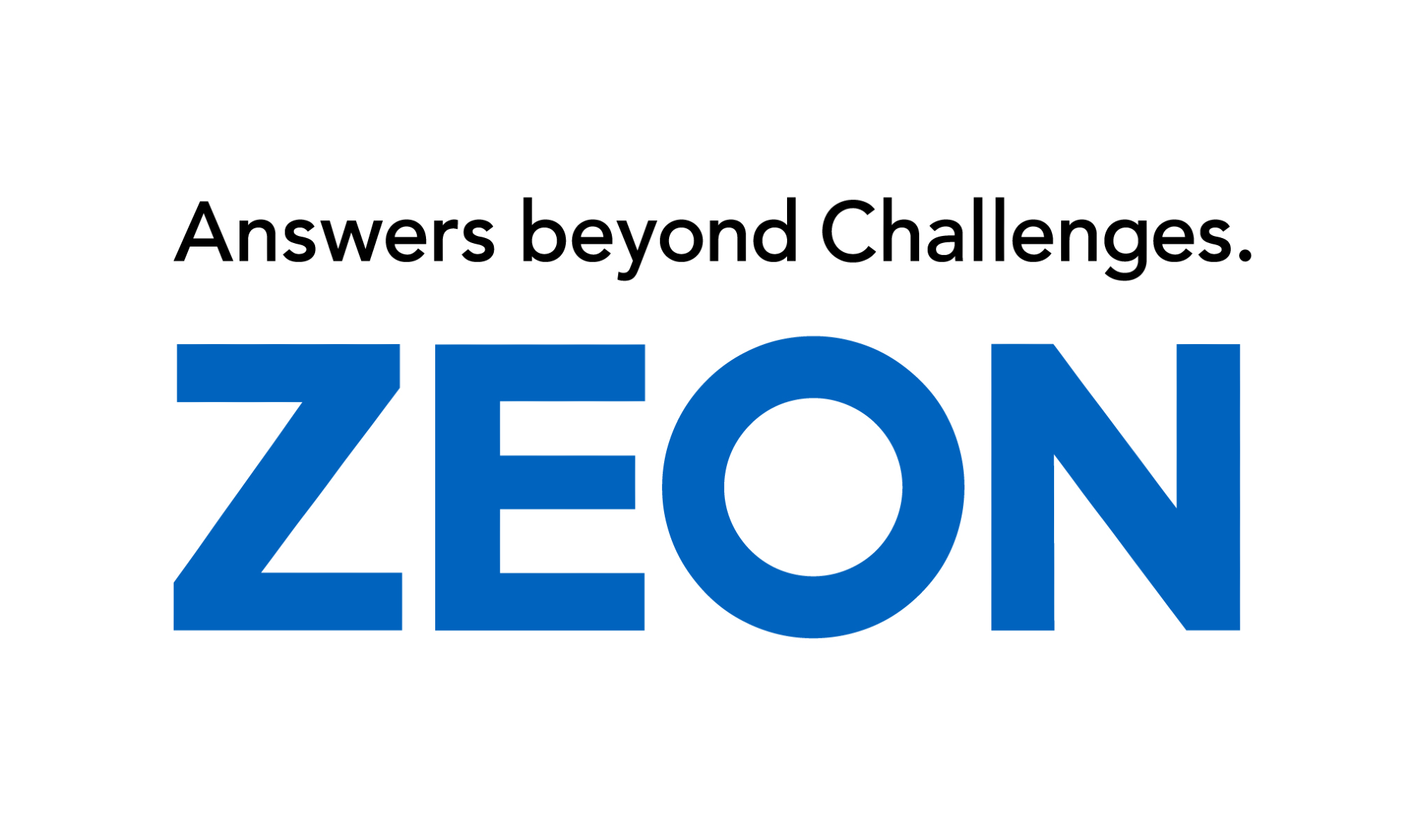
ZEON is among the world's top synthetic rubber producers and a market leader in the development and production of oil-resistant specialty rubbers for automotive components. In recent years, it has established sales bases in leading countries and built a tripolar network linking Japan and the rest of Asia with North America and Europe. ZEON's history is one of innovation, and numerous awards testify to the determination with which ZEON's international sites develop products and processes.
About ELRIG (UK) Ltd.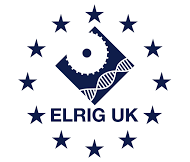
The European Laboratory Research & Innovation Group (ELRIG) is a leading European not-for-profit organization that exists to provide outstanding scientific content to the life science community. The foundation of the organization is based on the use and application of automation, robotics and instrumentation in life science laboratories, but over time, we have evolved to respond to the needs of biopharma by developing scientific programmes that focus on cutting-edge research areas that have the potential to revolutionize drug discovery.
Comprised of a global community of over 12,000 life science professionals, participating in our events, whether it be at one of our scientific conferences or one of our networking meetings, will enable any of our community to exchange information, within disciplines and across academic and biopharmaceutical organizations, on an open access basis, as all our events are free-of-charge to attend!
Our values
Our values are to always ensure the highest quality of content and that content will be made readily accessible to all, and that we will always be an inclusive organization, serving a diverse scientific network. In addition, ELRIG will always be a volunteer led organization, run by and for the life sciences community, on a not-for-profit basis.
Our purpose
ELRIG is a company whose purpose is to bring the life science and drug discovery communities together to learn, share, connect, innovate and collaborate, on an open access basis. We achieve this through the provision of world class conferences, networking events, webinars and digital content.
Sponsored Content Policy: News-Medical.net publishes articles and related content that may be derived from sources where we have existing commercial relationships, provided such content adds value to the core editorial ethos of News-Medical.Net which is to educate and inform site visitors interested in medical research, science, medical devices and treatments.
Last Updated: Nov 18, 2024